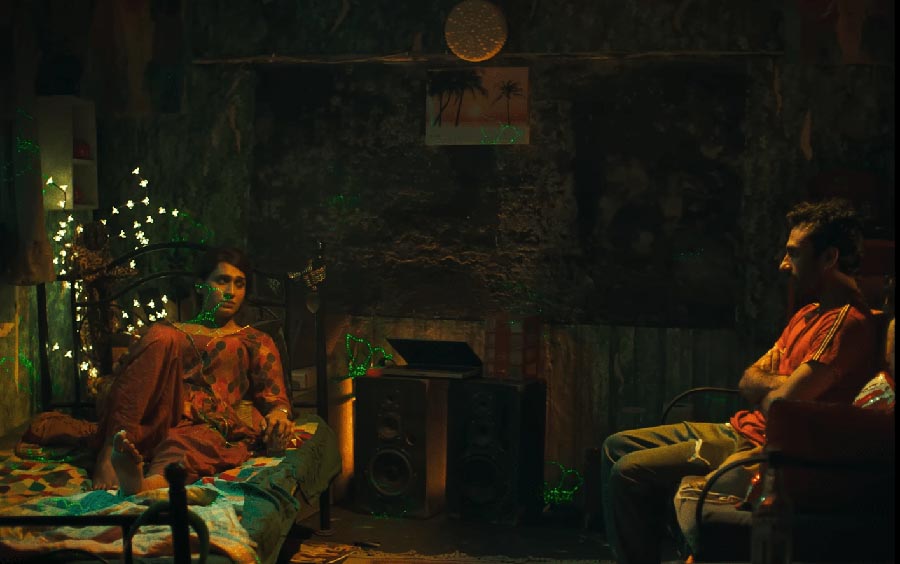Joyland tells the story of a man who falls in love with a transgender. As one might already guess from the first sentence, the movie got severe heat from religious factions for allegedly depicting a homosexual relationship. It then bagged the Queer Palm award, which paved the way for further criticism from those who hadn’t seen the movie in the first place. As always, the fundamentalist mindset held the state hostage, and the government banned its countrywide release. However, after much scrutiny, the federal government of Pakistan allowed it to be released whereas owing to the 18th amendment, Punjab banned it anyway.
Here’s a spoiler alert: the criticism against Joyland has got nothing to do with religion or society’s social values. It has got to do with “joy” in the movie’s name and “love” in its synopsis.

Why are we so defensive of our social and cultural values? It has a rather simple explanation: we are insecure about them. Any insecure person goes on the defensive when confronted with his weak spot. He doesn’t do anything about it, he only keeps trying to hide it.
Pakistani society is creamed with such minds. This mental insecurity translates from an individual to the collective, resulting in a confused, paranoid, and constantly threatened set of hollow social values. When Sharmeen Obaid Chinoy won an Academy Award for her short documentary ‘Saving Face,’ many Pakistanis villainized her for portraying a negative image of the country. Of course, that actually translates to her having exposed the society at large. One could quote statistics about the number of women in Pakistan who get their faces disfigured as a result of acid attacks, but facts and figures are useless for such societies. If one wants to truly learn, mere observation is enough.
The Hollywood movie Spotlight released in 2015 focused on the true story of four journalists who uncovered the story of paedophilia undergoing in the local Catholic church. It went on to win two Oscars that year, including best picture. When the actual story was published way back in 2002, it had launched a chain reaction in the United States. People all across the country started to come out with their own stories of abuse at the hands of the priests. Soon enough, the local issue culminated in shaking the core of the Roman Catholic Church at a global scale.
People fretted about the real issue that had been brought to light: society’s most trusted were caught molesting society’s most vulnerable. Such a scandal would tear apart the entire social fabric of any mentally fit society. It would demolish all social values built on conservative religious thought within a matter of seconds. Imagine, however, if such a story got uncovered here in Pakistan?
In the same year that Spotlight was released, a political scandal had broken out in Kasur involving child pornography and sexual abuse. Hundreds of videos were discovered which showed children performing forced sex acts in front of the camera. About 280 to 300 children were the alleged victims of sexual abuse with the majority of them being male. To top it all off, it was alleged that police and the local MPA were also involved in attempting to sweep the story under the rugs. One might think that there would have been lawsuits at the very least, if not capital punishments. Till date, however, there hasn’t been any proper investigation at all.
So why is it that an unreleased movie which tells the tale of love, however explicit and R-rated it might be, threatens our values more than an actual, real-life case of child sexual abuse and murder? The answer to this is again connected to our mental paranoia. We consider child abuse as something native, but we think homosexuality is being imposed on us. This has always been our problem: to shield against anything that we think is a Western agenda, even if it benefits us. That’s why there is a whole list of people who achieved global fame but were disowned by us. As soon as they are applauded by the West, our paranoia suddenly kicks in and we declare them to be villains. The same thing happened with Joyland.

The problem is not Joyland, nor is it homosexuality. The rising HIV epidemic in the country as per UN AIDS is a testament to that. Majority of the key populations living with HIV in Pakistan (except for those who acquired it through contaminated needles) are men who have had physical relations with men, or with transgenders. Even if facts are not brought in to back the argument of homosexuality already prevalent in the society, mere word of mouth from someone belonging to South Punjab, or to the villages of KP and Sindh should be enough to make anybody believe it.
Our religious bigots, however, will force people to think that a bunch of Western bums who have nothing else on their hands are coming up with new ways to impose homosexuality in the land of the pure. Let me save you the trouble: our society is as impure as one can get. Had our sociologists reported the data correctly, the number of child abuse cases, rapes, molestation, harassment, domestic violence, homosexuality, and bestiality would be much higher than what is documented.



